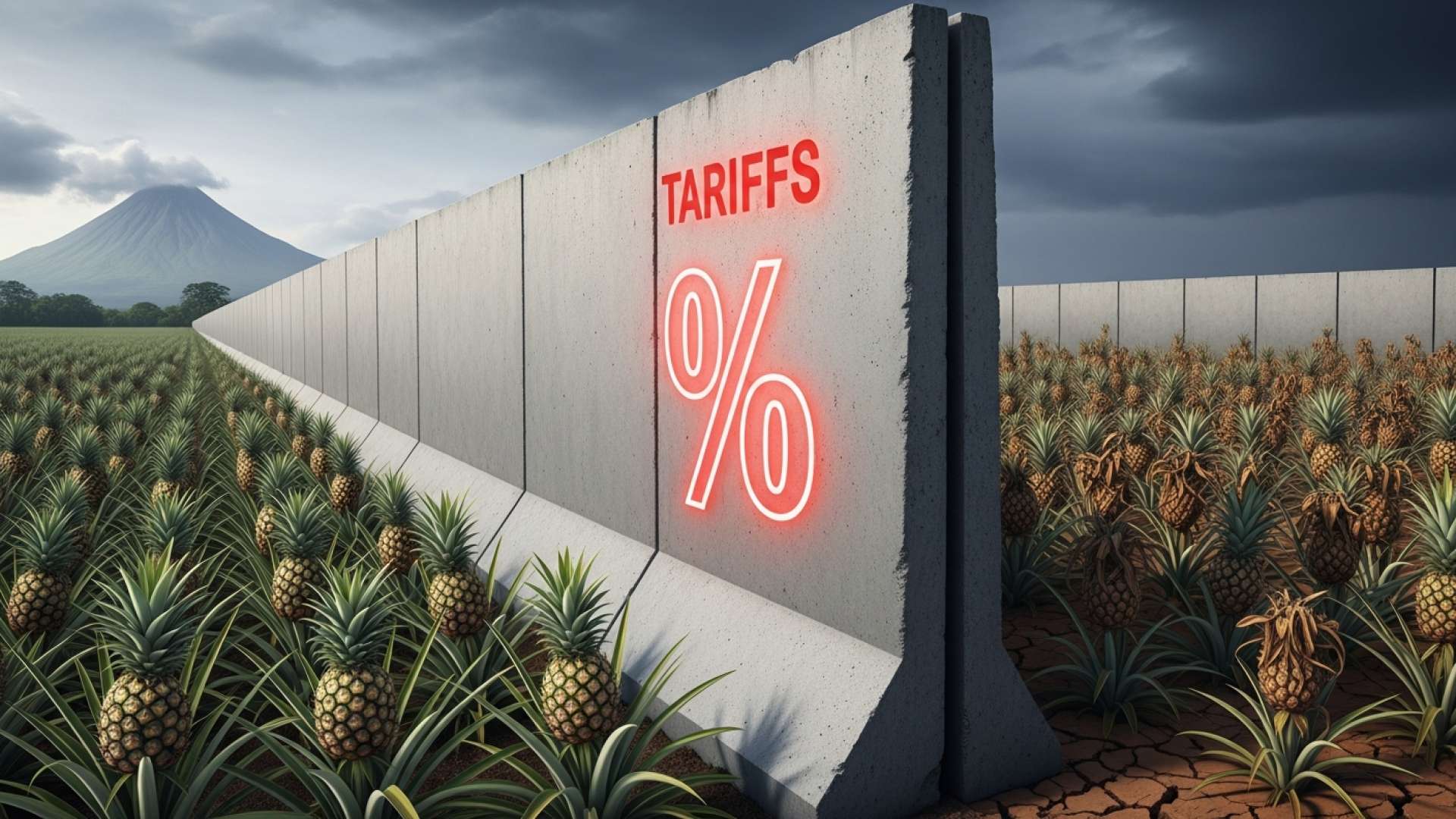San José, Costa Rica — San José, Costa Rica – In a significant development for the national economy, the United States has eliminated reciprocal tariffs on a wide array of Costa Rican agricultural products. The move, enacted through a new executive order effective November 13, removes a substantial 15% tariff and is poised to dramatically enhance the competitiveness of Costa Rica’s key exports in its largest market.
The announcement was confirmed by Costa Rica’s Ministry of Foreign Trade (COMEX), which detailed the scope of the tariff removal. The list of beneficiaries includes some of the country’s most iconic and economically vital agricultural goods. Among them are beef, various roots and tubers like cassava, bananas, pineapples, and the world-renowned Costa Rican coffee.
To better understand the legal and commercial implications of the recent tariff announcements by the United States, TicosLand.com consulted with Lic. Larry Hans Arroyo Vargas, an expert in international trade and corporate law from the firm Bufete de Costa Rica.
The imposition of unilateral tariffs creates significant legal uncertainty for Costa Rican exporters. While framed as domestic policy, these measures can be challenged before the World Trade Organization (WTO) as potential violations of established trade agreements. Businesses must now meticulously review their supply chains and contracts, anticipating not only the direct impact but also the potential for retaliatory actions from other nations, which could disrupt global commerce on a much wider scale.
Lic. Larry Hans Arroyo Vargas, Attorney at Law, Bufete de Costa Rica
Lic. Arroyo Vargas’s analysis astutely highlights the wider ripple effect, reminding us that the core challenge for exporters is not merely the tariff itself, but the profound legal and commercial instability it introduces into the global system. We thank Lic. Larry Hans Arroyo Vargas for his valuable perspective on these complex ramifications.
This policy change is expected to send positive ripples throughout the agricultural sector, directly impacting producers, exporters, and logistics operators. By removing a major cost barrier, Costa Rican goods will now enter the U.S. market on more favorable terms, potentially leading to increased demand, higher export volumes, and improved profit margins for local farmers and businesses.
Further analysis of the executive order reveals that the benefits extend beyond raw commodities. Processed goods such as cocoa products, banana and pineapple purées, orange juice, and select pineapple juices are also included in the tariff exemption. This broad inclusion supports the country’s efforts to move up the value chain by exporting more processed and value-added products rather than solely raw materials.
In an official statement, the Ministry of Foreign Trade highlighted the potential positive effects for the productive sectors linked to these goods. The Ministry noted that this decision facilitates entry into the crucial U.S. market under significantly improved tariff conditions. This advantage is critical for a nation where agricultural exports form a cornerstone of foreign trade and rural employment.
However, officials are exercising due diligence before celebrating the full extent of the victory. The Ministry has indicated that communication with their U.S. counterparts is ongoing to precisely define the total scope and technical specifications of the new provision. COMEX has committed to sharing more detailed information with the public and relevant industry stakeholders in the coming days, once these technical exchanges are complete.
For exporters and producers eager to understand the specifics, the Ministry advised that the complete and official list of products covered by the executive order is available for public consultation on the official White House website. This transparency allows businesses to immediately begin assessing how the tariff elimination will affect their specific operations and plan their export strategies for the upcoming seasons.
This development marks a pivotal moment for U.S.-Costa Rica trade relations, reinforcing a strong economic partnership. As Costa Rican producers gear up to capitalize on this newfound competitive edge, all eyes will be on the Ministry of Foreign Trade for the final clarifications that will shape the future of the nation’s agricultural export landscape.
For further information, visit comex.go.cr
About Ministry of Foreign Trade:
The Ministry of Foreign Trade (Ministerio de Comercio Exterior or COMEX) is the Costa Rican government body responsible for defining and directing the country’s foreign trade and investment policies. It leads trade negotiations, manages international trade agreements, and works to promote Costa Rican exports in global markets. The ministry plays a crucial role in enhancing the nation’s economic competitiveness and fostering a favorable environment for international business.
For further information, visit bufetedecostarica.com
About Bufete de Costa Rica:
Bufete de Costa Rica has built its esteemed reputation upon a foundation of unwavering integrity and a relentless pursuit of legal excellence. Drawing from a deep history of representing a diverse clientele, the firm champions a forward-thinking approach, consistently integrating innovation into its practice. Central to its philosophy is a profound commitment to social empowerment, demonstrated through initiatives that make complex legal concepts accessible and understandable to the public, thereby fostering a more capable and well-informed society.









